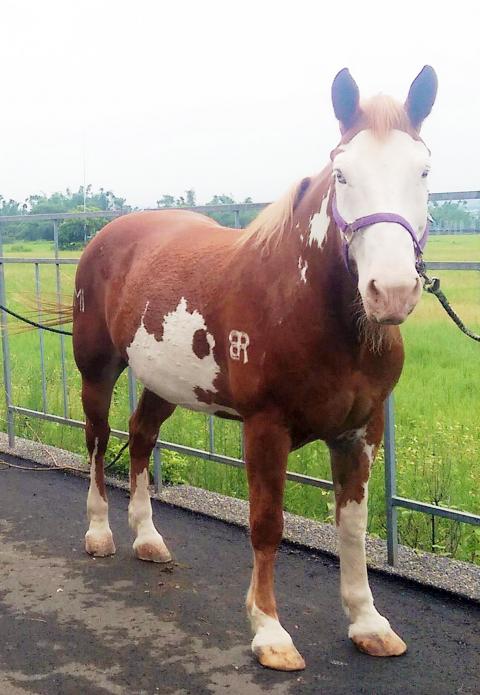Three government-owned horses that had been used to make antivenom for snakebites were retired on Friday after a decade of service at Nantou County’s Cingjing Farm (清境農場), the Centers for Disease Control said on Sunday.
In the antivenom-making process, horses are injected with reduced-strength snake venom that causes their immune systems to release antibodies which are then extracted from their blood, the centers’ Chief of Vaccines Chiang Cheng-jung (江正榮) said, adding that the blood is reinfused into the horses to aid their recovery.
The three horses, aged between three and five and identified as No. 304, No. 314 and No. 328, were bought from the US in 2006 and 2007 for NT$350,000 per horse, he said.

Photo courtesy of the Centers for Disease Control
Horses are the animal most commonly used for the production of anti-venom and a horse is usually used for 10 years, the centers said.
The retired horses were used in the production of antivenom for treating hundred pacer, brown-spotted pit viper and Stejneger’s pit viper bites and helped numerous snakebite victims, Chiang said.
While the horses have reached retirement age and are no longer fit for secreting antibodies, they are still in “very good health” and are aged about 50 in human years, Chiang said.
An average of 1,000 people are bitten by venomous snakes in Taiwan every year, requiring 45,000 doses of antivenom that are produced by the centers’ antibody-producing horses, Chiang said.
The centers said snake activity peaks between July and August, adding that this year, it has prepared 3,200 doses of antivenom for brown-spotted pit vipers and Stejneger’s pit vipers, 1,200 doses for many-banded kraits and Chinese cobras, 330 doses for the Chinese sharp-nosed viper — commonly known as the “hundred-pacer” —and 50 doses for Russell’s vipers.
The government expressed its gratitude to the horses and urged hikers to wear clothes that cover their limbs and to beat undergrowth with a stick before walking through it as a precaution against snakebites.

CARGO LOSS: About 50 containers at the stern of the ‘Ever Lunar’ cargo ship went overboard, prompting the temporary closure of the port and disrupting operations Evergreen Marine Corp, Taiwan’s largest container shipper, yesterday said that all crew members aboard the Ever Lunar (長月) were safe after dozens of containers fell overboard off the coast of Peru the previous day. The incident occurred at 9:40am on Friday as the Ever Lunar was anchored and waiting to enter the Port of Callao when it suddenly experienced severe rolling, Evergreen said in a statement. The rolling, which caused the containers to fall, might have been caused by factors including a tsunami triggered by an earthquake in Russia, poor winter sea conditions in South America or a sudden influx of waves,

The Ministry of Culture yesterday officially launched the “We TAIWAN” cultural program on Osaka’s Nakanoshima sandbank, with the program’s mascot receiving overwhelming popularity. The cultural program, which runs from Aug. 2 to 20, was designed to partner with and capitalize on the 2025 World Expo that is being held in Osaka, Japan, from April 13 to Oct. 13, the ministry said. On the first day of the cultural program, its mascot, a green creature named “a-We,” proved to be extremely popular, as its merch was immediately in high demand. Long lines formed yesterday for the opening

The Taipei Summer Festival is to begin tomorrow at Dadaocheng Wharf (大稻埕), featuring four themed firework shows and five live music performances throughout the month, the Taipei Department of Information and Tourism said today. The festival in the city’s Datong District (大同) is to run until Aug. 30, holding firework displays on Wednesdays and the final Saturday of the event. The first show is scheduled for tomorrow, followed by Aug. 13, 20 and 30. To celebrate the 30th anniversary of Disney Pixar's movie Toy Story, the festival has partnered with Walt Disney Co (Taiwan) to host a special themed area on

BE CAREFUL: The virus rarely causes severe illness or death, but newborns, older people and those with medical conditions are at risk of more severe illness As more than 7,000 cases of chikungunya fever have been reported in China’s Guangdong Province this year, including 2,892 new cases last week, the Centers for Disease Control (CDC) yesterday said it is monitoring the situation and considering raising the travel notice level, which might be announced today. The CDC issued a level 1 travel notice, or “watch,” for Guangdong Province on July 22, citing an outbreak in Foshan, a manufacturing hub in the south of the province, that was reported early last month. Between July 27 and Saturday, the province reported 2,892 new cases of chikungunya, reaching a total of 7,716